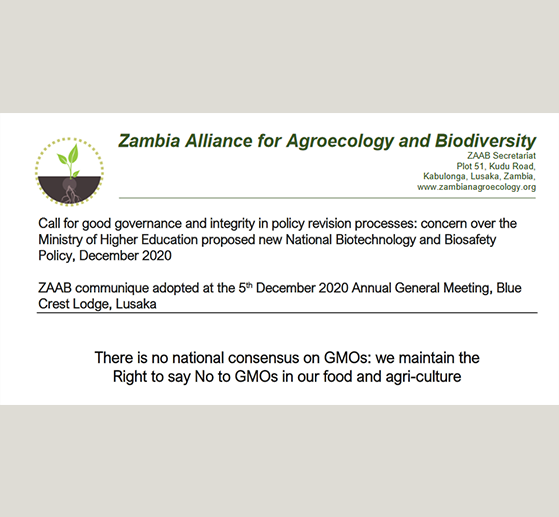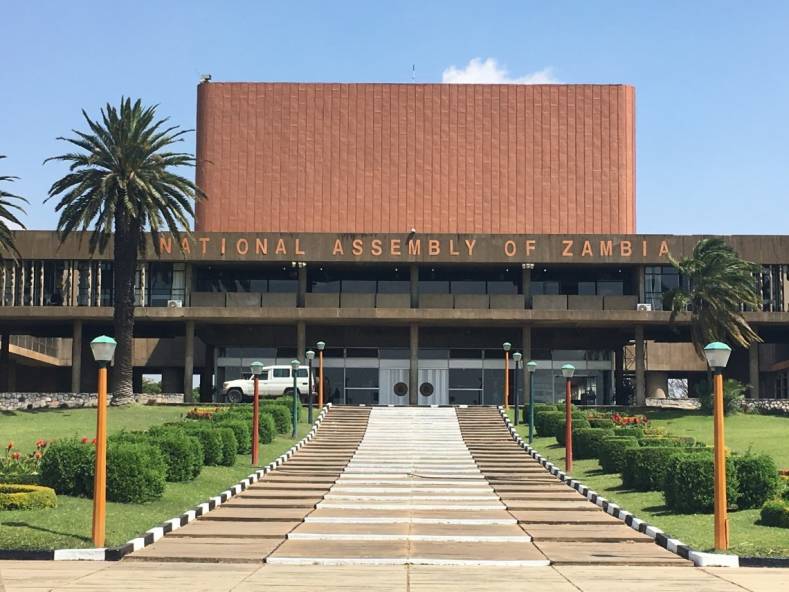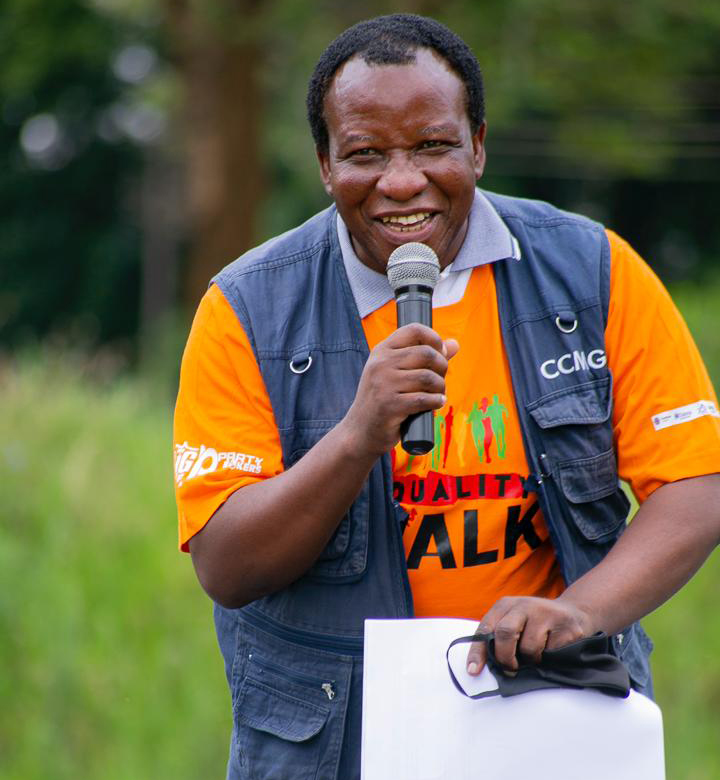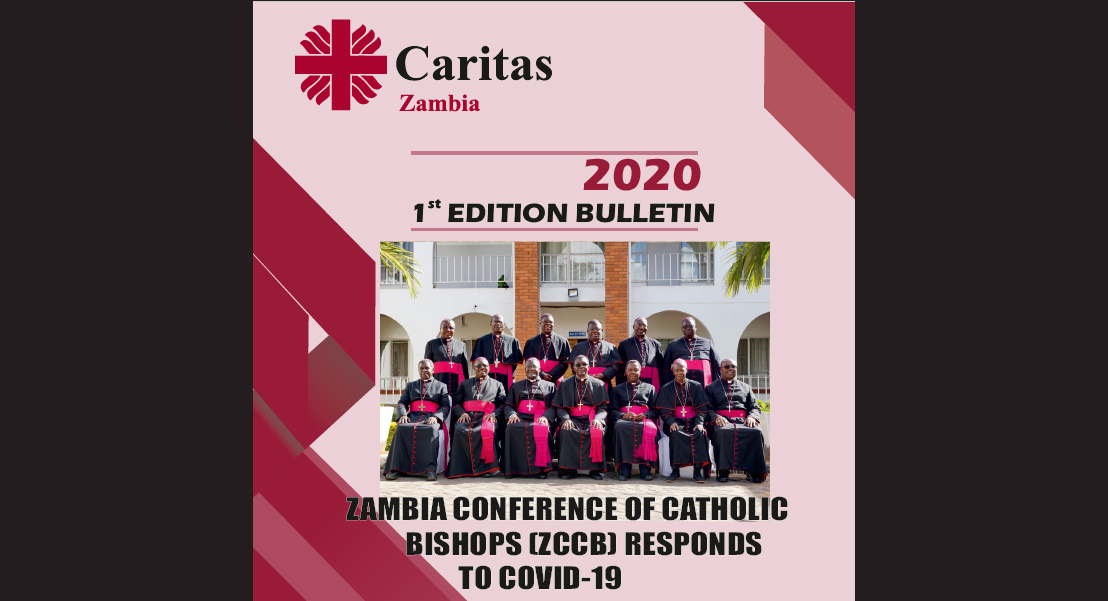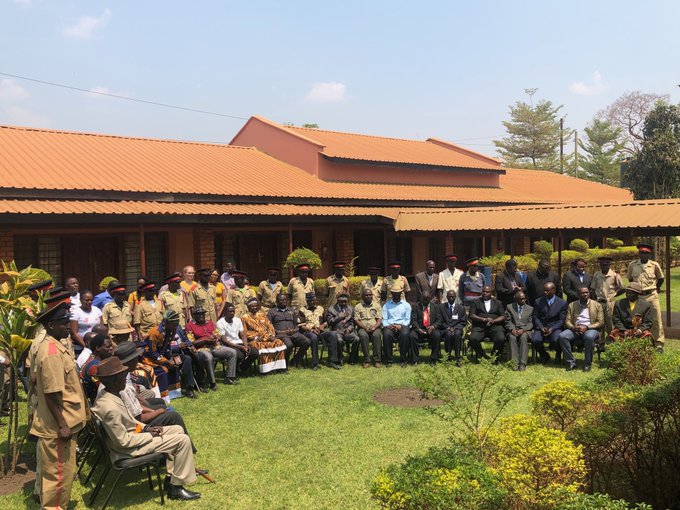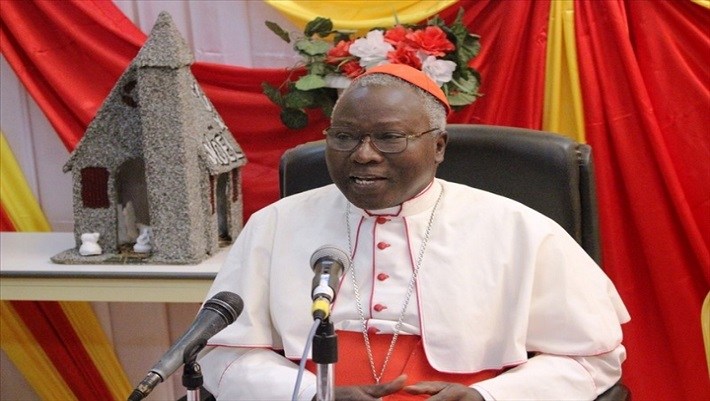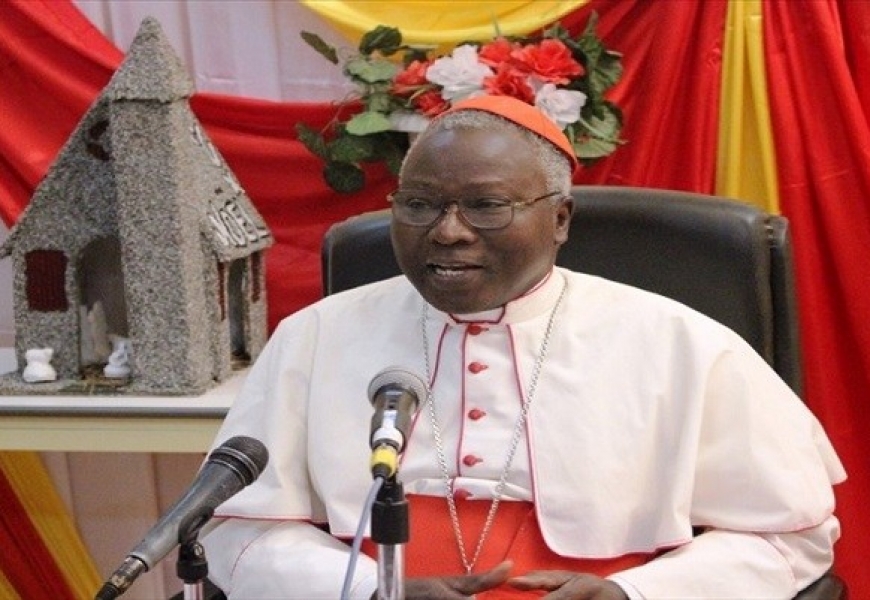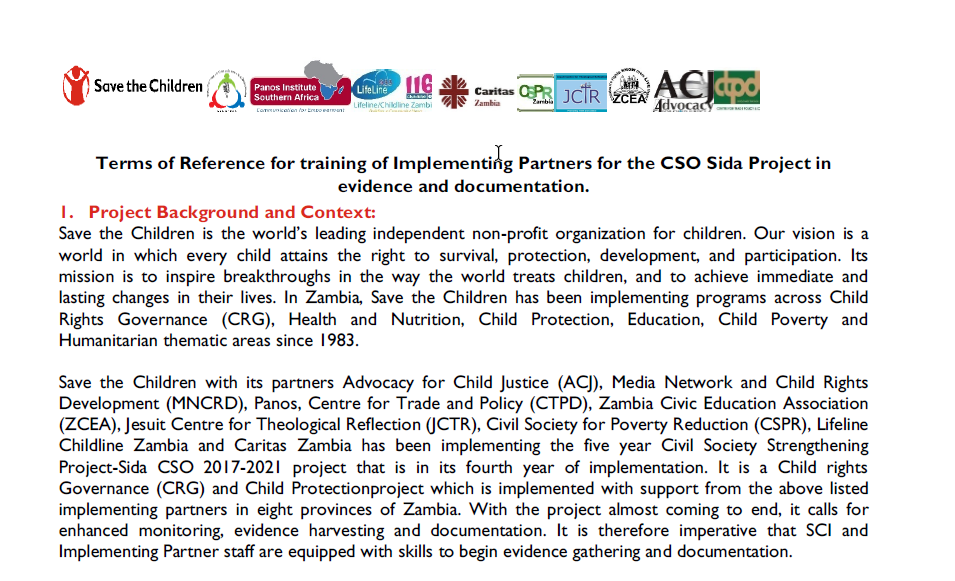The Zambia Alliance for Agroecology and Biodiversity (ZAAB) calls for good governance and integrity in policy revision processes and raises concern over the Ministry of Higher Education proposed new National Biotechnology and Biosafety Policy, December 2020.
ZAAB communique adopted at the 5th December 2020 Annual General Meeting, Blue Crest Lodge, Lusaka
There is no national consensus on GMOs: we maintain the Right to say No to GMOs in our food and agri-culture
We, the members of the Zambia Alliance for Agroecology and Biodiversity, reject the untimely and imbalanced revision of the Zambia Biotechnology and Biosafety Policy (BBP).
SUBMISSION TO THE PARLIAMENTARY COMMITTEE ON LEGAL AFFAIRS, HUMAN RIGHTS, NATIONAL GUIDANCE, GENDER MATTERS AND GOVERNANCE
“THE REVIEW OF THE OPERATIONS OF THE LANDS TRIBUNAL FOR ZAMBIA”
1.0. INTRODUCTION
Land in Zambia which, in the past was seen as sacred, spiritual and a basis of identity and a heritage for many of the indigenous societies, throughout the country, is now taken as a commodity that can be transacted for money. As a result, there is fierce competition out there. People holding customary land such as headpersons, some Chiefs and individuals are busy selling it to the highest bidder including foreigners whose status are either unknown or highly questionable. This practice of selling customary land has displaced many people, especially the vulnerable poor villagers who depend on it for their livelihoods. Their inability to defend their land rights against the rich and powerful in the Zambian society today has made them very vulnerable. In a number of cases many of them have become landless and villageless, because their villages have either been sold off or taken over by the expansion of new districts, leading to loss of identity of the displaced people.
Download the entire SUBMISSION TO THE PARLIAMENTARY COMMITTEE ON LEGAL AFFAIRS, HUMAN RIGHTS, NATIONAL GUIDANCE, GENDER MATTERS AND GOVERNANCE here https://caritaszambia.org/phocadownload/key_papers/Lands-Tribunal-Presentation.pdf
Protocol:
We are excited today as we kick off this year’s Walk to fight inequality in Zambia and indeed in the world during this Global 16 Days Campaign, the longest-running campaign to end violence against women, and all vulnerable people. Am sure that we are all agreed that we need to put a stop to gender-based violence and harassment against each other in Zambia.
This crisis of violence against women, children, persons with disability and now to some great extent men, is a great shame to all of us living in our beloved country Zambia. It goes against our African values and tradition which sometimes we accuse of being the root cause of the vice. We are afraid to own up and realise that the inequality that we have created in our socio-economic and political structures is responsible for the increased violence we see. We grew up being taught that as men and boys we must respect women and protect children. We were taught to never, raise a finger against women and even in the wars and fights we had with one another in the past, women and children were not killed-Their lives were always spared.
MESSAGE OF HIS HOLINESS POPE FRANCIS
FOURTH WORLD DAY OF THE POOR
33rd Sunday in Ordinary Time
15 November 2020
“Stretch forth your hand to the poor” (Sir 7:32)
“Stretch forth your hand to the poor” (Sir 7:32). Age-old wisdom has proposed these words as a sacred rule to be followed in life. Today these words remain as timely as ever. They help us fix our gaze on what is essential and overcome the barriers of indifference. Poverty always appears in a variety of guises, and calls for attention to each particular situation. In all of these, we have an opportunity to encounter the Lord Jesus, who has revealed himself as present in the least of his brothers and sisters (cf. Mt 25:40).
1. Let us take up the Old Testament book of Sirach, in which we find the words of a sage who lived some two hundred years before Christ. He sought out the wisdom that makes men and women better and more capable of insight into the affairs of life. He did this at a time of severe testing for the people of Israel, a time of suffering, grief and poverty due to the domination of foreign powers. As a man of great faith, rooted in the traditions of his forebears, his first thought was to turn to God and to beg from him the gift of wisdom. The Lord did not refuse his help.
From the book’s first pages, its author presents his advice concerning many concrete situations in life, one of which is poverty. He insists that even amid hardship we must continue to trust in God: “Do not be alarmed when disaster comes. Cling to him and do not leave him, so that you may be honoured at the end of your days. Whatever happens to you, accept it, and in the uncertainties of your humble state, be patient, since gold is tested in the fire, and chosen men in the furnace of humiliation. Trust him and he will uphold you, follow a straight path and hope in him. You who fear the Lord, wait for his mercy; do not turn aside in case you fall” (2:2-7).
2. In page after page, we discover a precious compendium of advice on how to act in the light of a close relationship with God, creator and lover of creation, just and provident towards all his children. This constant reference to God, however, does not detract from a concrete consideration of mankind. On the contrary, the two are closely connected.
This is clearly demonstrated by the passage from which the theme of this year’s Message is taken (cf. 7:29-36). Prayer to God and solidarity with the poor and suffering are inseparable. In order to perform an act of worship acceptable to the Lord, we have to recognize that each person, even the poorest and most contemptible, is made in the image of God. From this awareness comes the gift of God’s blessing, drawn by the generosity we show to the poor. Time devoted to prayer can never become an alibi for neglecting our neighbour in need. In fact the very opposite is true: the Lord’s blessing descends upon us and prayer attains its goal when accompanied by service to the poor.
3. How timely too, for ourselves, is this ancient teaching! Indeed, the word of God transcends space and time, religions and cultures. Generosity that supports the weak, consoles the afflicted, relieves suffering and restores dignity to those stripped of it, is a condition for a fully human life. The decision to care for the poor, for their many different needs, cannot be conditioned by the time available or by private interests, or by impersonal pastoral or social projects. The power of God’s grace cannot be restrained by the selfish tendency to put ourselves always first.
Keeping our gaze fixed on the poor is difficult, but more necessary than ever if we are to give proper direction to our personal life and the life of society. It is not a matter of fine words but of a concrete commitment inspired by divine charity. Each year, on the World Day of the Poor, I reiterate this basic truth in the life of the Church, for the poor are and always will be with us to help us welcome Christ’s presence into our daily lives (cf. Jn 12:8).
4. Encountering the poor and those in need constantly challenges us and forces us to think. How can we help to eliminate or at least alleviate their marginalization and suffering? How can we help them in their spiritual need? The Christian community is called to be involved in this kind of sharing and to recognize that it cannot be delegated to others. In order to help the poor, we ourselves need to live the experience of evangelical poverty. We cannot feel “alright” when any member of the human family is left behind and in the shadows. The silent cry of so many poor men, women and children should find the people of God at the forefront, always and everywhere, in efforts to give them a voice, to protect and support them in the face of hypocrisy and so many unfulfilled promises, and to invite them to share in the life of the community.
The Church certainly has no comprehensive solutions to propose, but by the grace of Christ she can offer her witness and her gestures of charity. She likewise feels compelled to speak out on behalf of those who lack life’s basic necessities. For the Christian people, to remind everyone of the great value of the common good is a vital commitment, expressed in the effort to ensure that no one whose human dignity is violated in its basic needs will be forgotten.
5. The ability to stretch forth our hand shows that we possess an innate capacity to act in ways that give meaning to life. How many outstretched hands do we see every day! Sadly, it is more and more the case that the frenetic pace of life sucks us into a whirlwind of indifference, to the point that we no longer know how to recognize the good silently being done each day and with great generosity all around us. Only when something happens that upsets the course of our lives do our eyes become capable of seeing the goodness of the saints “next door”, of “those who, living in our midst, reflect God’s presence” (Gaudete et Exsultate, 7), but without fanfare. Bad news fills the pages of newspapers, websites and television screens, to the point that evil seems to reign supreme. But that is not the case. To be sure, malice and violence, abuse and corruption abound, but life is interwoven too with acts of respect and generosity that not only compensate for evil, but inspire us to take an extra step and fill our hearts with hope.
6. A hand held out is a sign; a sign that immediately speaks of closeness, solidarity and love. In these months, when the whole world was prey to a virus that brought pain and death, despair and bewilderment, how many outstretched hands have we seen! The outstretched hands of physicians who cared about each patient and tried to find the right cure. The outstretched hands of nurses who worked overtime, for hours on end, to look after the sick. The outstretched hands of administrators who procured the means to save as many lives as possible. The outstretched hands of pharmacists who at personal risk responded to people’s pressing needs. The outstretched hands of priests whose hearts broke as they offered a blessing. The outstretched hands of volunteers who helped people living on the streets and those with a home yet nothing to eat. The outstretched hands of men and women who worked to provide essential services and security. We could continue to speak of so many other outstretched hands, all of which make up a great litany of good works. Those hands defied contagion and fear in order to offer support and consolation.
7. This pandemic arrived suddenly and caught us unprepared, sparking a powerful sense of bewilderment and helplessness. Yet hands never stopped reaching out to the poor. This has made us all the more aware of the presence of the poor in our midst and their need for help. Structures of charity, works of mercy, cannot be improvised. Constant organization and training is needed, based on the realization of our own need for an outstretched hand.
The present experience has challenged many of our assumptions. We feel poorer and less selfsufficient because we have come to sense our limitations and the restriction of our freedom. The loss of employment, and of opportunities to be close to our loved ones and our regular acquaintances, suddenly opened our eyes to horizons that we had long since taken for granted. Our spiritual and material resources were called into question and we found ourselves experiencing fear. In the silence of our homes, we rediscovered the importance of simplicity and of keeping our eyes fixed on the essentials. We came to realize how much we need a new sense of fraternity, for mutual help and esteem. Now is a good time to recover “the conviction that we need one another, that we have a shared responsibility for others and the world… We have had enough of immorality and the mockery of ethics, goodness, faith and honesty… When the foundations of social life are corroded, what ensues are battles over conflicting interests, new forms of violence and brutality, and obstacles to the growth of a genuine culture of care for the environment” (Laudato Si’, 229). In a word, until we revive our sense of responsibility for our neighbour and for every person, grave economic, financial and political crises will continue.
8. This year’s theme – “Stretch forth your hand to the poor” – is thus a summons to responsibility and commitment as men and women who are part of our one human family. It encourages us to bear the burdens of the weakest, in accord with the words of Saint Paul: “Through love serve one another. For the whole law is fulfilled in one word: ‘You shall love your neighbour as yourself’… Bear one another’s burdens, and so fulfil the law of Christ” (Gal 5:13-14; 6:2). The Apostle teaches that the freedom bestowed through the death and resurrection of Jesus Christ makes us individually responsible for serving others, especially the weakest. This is not an option, but rather a sign of the authenticity of the faith we profess.
Here again, the book of Sirach can help us. It suggests concrete ways to support the most vulnerable and it uses striking images. First, it asks us to sympathize with those who are sorrowing: “Do not fail those who weep” (7:34). The time of pandemic forced us into strict isolation, making it impossible even to see and console friends and acquaintances grieving the loss of their loved ones. The sacred author also says: “Do not shrink from visiting the sick” (7:35). We have been unable to be close to those who suffer, and at the same time we have become more aware of the fragility of our own lives. The word of God allows for no complacency; it constantly impels us to acts of love.
9. At the same time, the command: “Stretch forth your hand to the poor” challenges the attitude of those who prefer to keep their hands in their pockets and to remain unmoved by situations of poverty in which they are often complicit. Indifference and cynicism are their daily food. What a difference from the generous hands we have described! If they stretch out their hands, it is to touch computer keys to transfer sums of money from one part of the world to another, ensuring the wealth of an elite few and the dire poverty of millions and the ruin of entire nations. Some hands are outstretched to accumulate money by the sale of weapons that others, including those of children, use to sow death and poverty. Other hands are outstretched to deal doses of death in dark alleys in order to grow rich and live in luxury and excess, or to quietly pass a bribe for the sake of quick and corrupt gain. Others still, parading a sham respectability, lay down laws which they themselves do not observe.
Amid all these scenarios, “the excluded are still waiting. To sustain a lifestyle which excludes others, or to sustain enthusiasm for that selfish ideal, a globalization of indifference has developed. Almost without being aware of it, we end up being incapable of feeling compassion at the outcry of the poor, weeping for other people’s pain, and feeling a need to help them, as though all this were someone else’s responsibility and not our own” (Evangelii Gaudium, 54). We cannot be happy until these hands that sow death are transformed into instruments of justice and peace for the whole world.
10. “In everything you do, remember your end” (Sir 7:36). These are the final words of this chapter of the book of Sirach. They can be understood in two ways. First, our lives will sooner or later come to an end. Remembering our common destiny can help lead to a life of concern for those poorer than ourselves or lacking the opportunities that were ours. But second, there is also an end or goal towards which each of us is tending. And this means that our lives are a project and a process. The “end” of all our actions can only be love. This is the ultimate goal of our journey, and nothing should distract us from it. This love is one of sharing, dedication and service, born of the realization that we were first loved and awakened to love. We see this in the way children greet their mother’s smile and feel loved simply by virtue of being alive. Even a smile that we can share with the poor is a source of love and a way of spreading love. An outstretched hand, then, can always be enriched by the smile of those who quietly and unassumingly offer to help, inspired only by the joy of living as one of Christ’s disciples.
In this journey of daily encounter with the poor, the Mother of God is ever at our side. More than any other, she is the Mother of the Poor. The Virgin Mary knows well the difficulties and sufferings of the marginalized, for she herself gave birth to the Son of God in a stable. Due to the threat of Herod, she fled to another country with Joseph her spouse and the child Jesus. For several years, the Holy Family lived as refugees. May our prayer to Mary, Mother of the Poor, unite these, her beloved children, with all those who serve them in Christ’s name. And may that prayer enable outstretched hands to become an embrace of shared and rediscovered fraternity.
Rome, Saint John Lateran, 13 June 2020
Memorial of Saint Anthony of Padua
Franciscus
©Copyright - Libreria Editrice Vaticana
The Complete Message in PDF Version here https://caritaszambia.org/phocadownload/homillies/Message-of-Pope-Francis-for-the-Fourth-World-Day-of-the-Poor.pdf
EDITORIAL COMMENT
Not so long ago we were living a normal life: going about our daily business, school, and work, interacting in diverse circumstances. As we present this edition of our bulletin, Coronavirus has changed everything. A disease that the World Health Organization has declared a pandemic. COVID-19 pandemic travel and movement restrictions are having a devastating impact on livelihoods for vulnerable societies and Zambia has not been spared. Like many other countries globally, Zambia reported its first case on the 18th March 2020, initially as imported cases into the country, but over time the trend has changed as we are witnessing an increase in local transmission. The disease is spreading very fast, taking its toll on many sector operations across the country, and we as an organisation have not been spared. With a majority of civil society organisations no longer able to work with their local communities, due to various reasons such as the uncertainty over financing necessary to carry on with supporting local communities in the wake of the Covid-19 pandemic and just the general safety of both staff and community members.
This is extremely worrying and needs concerted efforts to ensure that we keep supporting communities, especially the most vulnerable. It is evident that Covid-19 will have far more reaching consequences on our society and the operations of many organisations such as ours going forward. Caritas Zambia with the support of the Zambia Conference of Catholic Bishops (ZCCB) in anticipating some of the potential effects of the Covid-19 pandemic has continued to undertake activities towards responding to the pandemic under the new normal and set out guidelines. This edition gives you a sneak pick into what the church, through the conference, is doing to respond to the covid_19 pandemic and how it is complementing government efforts. Remember that together we can win the fight. Maintain hygiene by washing our hands with soap and running water, using an alcohol-based sanitizer and remember to musk up!
Download the entire Caritas Zambia News Bulleting, 2020 – 1st Edition here: https://caritaszambia.org/phocadownload/general/Caritas-Zambia-News-Bulletin-2020-1st-Edition.pdf
LUAPULA MINING INSAKA CHARTER OF DEMANDS
Current Problems Surrounding Mining in the Province
1. Centralized Issuance of Mining Licenses.
The Ministry of mines lacks a comprehensive and transparent licensing and mineral rights management system which is decentralized and participatory. Such a situation is causing vulnerability to displacements and food insecurity as most of customary land is being lost to mining
2. Non Compliance to legal and Policy Frameworks
Illegal mining is high and most of the licensed mining companies do not adhere to the provisions of law on mining, environment, employment and tax returns.
Download the entire signed message here: https://caritaszambia.org/phocadownload/general/Luapula_Mining_Insaka_Charter_of_Demands.pdf
2ND NORTH WESTERN PROVINCE CHIEFS INDABA
Communique
The Royal Solwezi Hotel, Solwezi - 24th to 25th August 2020.
“Land, Environment and Accountable Mining.”
PREAMBLE
We, the Royal Highnesses of the North-Western province, particularly Mushindamo, Zambezi, Solwezi, Kalumbila, Kasempa, Mufumbwe, Manyinga, Kabompo, Zambezi, Mwinilunga and Ikeleng’e districts, met on the 24th and 25th of August 2020 under the auspices of Caritas Solwezi, Caritas Zambia, Non-Government Gender Organization Coordinating Council(NGOCC), Transparency International Zambia (TIZ), Foundation for Democratic Process (FODEP), Diakonia Zambia, Civil Society for Poverty Reduction (CSPR), Zambia Land Alliance (ZLA), Action Aid, Joint Country Programme (JCP), Extractive Industries Transparency Alliance (EITA), the Media Institute of Southern Africa (MISA) - Zambia and the Jesuit Centre for Theological Reflections (JCTR) for a Provincial Chiefs Indaba, held under the theme “Land, Environment and Accountable Mining.” This year’s Chiefs Indaba presented an opportunity to make follow-ups on recommendations previously made and re-strategize, so as to come with best practices that encourage Equal Beneficiation and Meaningful, Sustainable Integral Development for all.
Download the entire signed message here: https://caritaszambia.org/phocadownload/general/2nd_North_Western_Province_Chiefs_Indaba.pdf
A MESSAGE FROM SECAM PRESIDENT
Introduction
The Symposium of Episcopal Conferences of Africa and Madagascar, known by the acronym SECAM, was founded by African Bishops on 29th July 1969 and formally launched by Saint Pope Paul VI on 31st July 1969 in Rubaga Cathedral, Kampala, Uganda. To keep alive this historic and memorable event, 29th July of every year is commemorated as SECAM Day. The day is set aside for all members of the Church-Family of God in Africa and the surrounding Islands to thank God for the gift of mother Africa, for the gift of one another and for the gift of the Christian faith. It also provides an opportunity to pray for the well-being of SECAM, for the spirit of unity, communion and solidarity amongst the Bishops, the clergy, the religious and lay faithful.
In line with the decision taken at the Plenary Assembly of SECAM in Kinshasa, Democratic Republic of Congo (DRC) in July 2013, the Day is further an occasion to speak about the Symposium to enable Catholics throughout the Continent and the Islands become more informed about its existence, work and mission, and invite them to identify with, and support SECAM. To that end, the celebration of SECAM Day is shifted to the following Sunday when 29th July falls on a week day, and a special collection is taken to support the activities of the Symposium. Therefore, SECAM Day this year is to be celebrated on 2nd August 2020.
One Year after SECAM Golden Jubilee Celebration
This year 2020 marks one year since the impressive celebration of the Golden Jubilee of SECAM in Kampala, Uganda, the land of heroic African Martyrs. The Jubilee year (2019) of our Association coincided with the Silver Jubilee of the First Special Assembly for Africa of the Synod of Bishops, held in 1994, during which the African Synod Fathers chose not only to define the Church as God's Family but also to be a guiding principle for the Evangelization of the Continent (Ecclesia in Africa no. 63).
During the study as well as the plenary sessions in Kampala last year, we SECAM members reflected on how far we had gone with our evangelizing mission, where we need to go and how to make the future even better. We also bemoaned the plight of the majority of our people. And challenged by the example of Ugandan martyrs, in particular, and other African saints and martyrs, in general, we all resolved, amongst other details, to:
i. Make the Golden Jubilee a springboard for more profound Evangelization on the Continent and its Islands; seeking in the process, personal encounter with Jesus Christ that leads to true conversion and witness of life, enabling us not only to hold firm to our Catholic faith, doctrine and identity but concretely exhibit the spirit of Church-Family of God, solidarity, trust, acceptance, dialogue etc. everywhere in Africa and Madagascar;
ii. Intensify our commitment to the vision of the founding Fathers of SECAM centred on promoting organic pastoral solidarity and communion amongst the members of SECAM, which again typifies the image of Church as God’s Family, where everyone is treated as a true brother and sister, his/her dignity as a child of God upheld;
iii. Step up our obligation to SECAM (cf., Ecclesia in Africa no. 104);
iv. Be more proactive in our prophetic mission
The Golden Jubilee celebration evidently raised hopes that SECAM would more visibly play its role and exert a positive influence on areas that touch the daily life of the people, both within and outside Africa. Indeed, exerting a positive impact is a major focus of the current SECAM leadership.
Unfortunately, one year after the Golden Jubilee, the situation in Africa and the surrounding Islands has remained the same, within and outside the Church. Indeed, it is compounded by the corona virus pandemic that has wreaked havoc everywhere. Covid-19 has so far killed millions around the world including Africans. It has affected the Clergy, religious and lay faithful alike.
Different measures have been adopted to contain the spread of the disease, and we have also been praying for an end to the pandemic but new cases continue to soar in many African countries as elsewhere. Moreover, a recent report from the Caritas International indicates that Africa is the worst affected of all continents in terms of Covid-19 effects. There are cases of food shortages, due to the lockdowns. “Thousands have lost jobs, small businesses destroyed. The diversity of pre-existing disasters such as floods, drought, locust invasion, poor harvest are real and constitute a serious challenge”[1].
This situation has given rise to several questions and agitations. For those in the grip of anguish and misery, it is easy to conclude that God has abandoned us and the pandemic is punishment for our sins, individual and communal. But as we already said in our Pentecost Message: “If, we experience pain or if we suffer, [God] participates in it in order to overcome it”. St. Augustine said long ago: "Being supremely good, God would not allow any evil in his works, unless in his omnipotence and goodness, he is able to bring forth good out of evil” (Enchiridion 11, 3; PL 40, 236)[2], which is why he allowed his beloved Son to die a criminal’s death on the Cross. And the death of the Son changed the meaning of every kind of suffering and pain, physical and moral; not only of those who have faith but of every human person[3].
Amidst the current situation, we say ‘courage’ brothers and sisters; do not give in to despair; continue to pray and wait for God’s time. Like the Lord’s vision in Habakkuk, “if it comes slowly, wait, for come it will, without fail” (Hab 2:3). Be assured of our continued closeness to you and our daily prayers for you, especially, those of you who are sick or experiencing different challenges in your daily life.
COVID-19 has exposed how vulnerable we are, irrespective of colour or status, and what happens in one country affects people in the other. Indeed, it has shown that we are one people and we need to be each other’s’ keeper. As mentioned in the Pentecost Message, this is a time for all African peoples to reactivate the value of solidarity that has shaped our worldview and traditional society. It is doing so that we will be better placed to “face the impact of the pandemic and to turn our economies around, while relying on the power of the Holy Spirit, who gives us the grace to love and to be compassionate. In this time when many are in dire need, let us help them to experience the love of God”.
It is shameful and regretful that not even the deadly Covid-19 has deterred violence and terrorism in some countries in Africa; we continue to kill ourselves on a daily basis. We join our voice with the Holy Father, Pope Francis and other world leaders to call for an immediate end to violence everywhere in Africa and elsewhere in the world.
Appreciation
We certainly have had moments of sorrow but there were also joyful moments in the last one year. We, therefore, thank God for his blessings and magnanimity. We are also profoundly grateful to our Bishops, clergy, religious and lay members of the Church-Family of God throughout Africa and Islands for their commitment to Evangelization in spite of the current challenges.
We appreciate the efforts that have been made by respective governments to contain the vicious spread of corona virus in the Continent and we encourage the leaders to continue protecting the health of the population. We also thank all the health professionals, including religious nuns who have shown extraordinary dedication to alleviating the suffering of the sick.
We thank everyone within and outside Africa and Madagascar who has journeyed with, and supported SECAM in the past year. We are equally grateful to all those involved in the immediate affairs of SECAM (Presidency, Treasurer, Standing Committee members, Comitheol members and secretarial staff members) for their dedication, hard work and sacrifices for SECAM.
To all Africans and Malagasy we say, your generous support expands SECAM mission, increases its out-reach, and helps us to serve the Church and the society better.
SECAM day is an important event for the Church-Family of God in Africa and Madagascar. We earnestly urge you to pray for SECAM on Wednesday 29th July and 2nd August 2020. Following the challenges posed by the coronavirus pandemic at the moment, we have opted to defer the special SECAM collection for this year. But if any person or group of people are moved by the Holy Spirit to support SECAM financially or materially, you are welcome do so.
May the Virgin Mary, Queen of Africa, ensure the maternal protection for her children!
SIGNED:
Philippe Cardinal OUÉDRAOGO
President of SECAM
[1] Paul Samasumo, https://www.vaticannews.va/en, 22nd May 2020.
[2] Cf. Fr. Raniero Cantalamessa, Homily during the Celebration of the Passion of the Lord St. Peter’s Basilica Friday 10th April 2020, https://www.vaticannews.va/en.
[3] Fr. Raniero Cantalamessa, Homily during the Celebration of the Passion of the Lord, April 2020.
Download the entire signed message here: https://caritaszambia.org/phocadownload/general/President-SECAM-Day-2020-Eng-II-1.pdf
ZCCB STATEMENT ON THE CONSTITUTION AMENDMENT (BILL NO.10 OF 2019)
“Happy are those who hunger and thirst for what is right; they shall be satisfied” (Mathew 5: 6)
- 1. To the Catholic faithful in Zambia and all people of good will.
- 2. We, the Catholic Bishops of Zambia, greet you in the name of our Lord Jesus Christ.
Download the entire ZCCB Statement on Constitution Amendment Bill No 10 of 2019 here: https://caritaszambia.org/phocadownload/general/ZCCB-Statement-on-Constitution-Amendment-Bill-No-10-of-2019.pdf
1. Project Background and Context:
Save the Children is the world’s leading independent non-profit organization for children. Our vision is a world in which every child attains the right to survival, protection, development, and participation. Its mission is to inspire breakthroughs in the way the world treats children, and to achieve immediate and lasting changes in their lives. In Zambia, Save the Children has been implementing programs across Child Rights Governance (CRG), Health and Nutrition, Child Protection, Education, Child Poverty and Humanitarian thematic areas since 1983.
Save the Children with its partners Advocacy for Child Justice (ACJ), Media Network and Child Rights Development (MNCRD), Panos, Centre for Trade and Policy (CTPD), Zambia Civic Education Association (ZCEA), Jesuit Centre for Theological Reflection (JCTR), Civil Society for Poverty Reduction (CSPR), Lifeline Childline Zambia and Caritas Zambia has been implementing the five year Civil Society Strengthening Project-Sida CSO 2017-2021 project that is in its fourth year of implementation. It is a Child rights Governance (CRG) and Child Protection project which is implemented with support from the above listed implementing partners in eight provinces of Zambia. With the project almost coming to end, it calls for enhanced monitoring, evidence harvesting and documentation. It is therefore imperative that SCI and Implementing Partner staff are equipped with skills to begin evidence gathering and documentation.
2. Objective
Build capacity of SCI and Implementing Partner staff in report writing, evidence gathering and documentation.
3. Methodology
In order to achieve the objective of this assignment, the successful consultant is expected to: • Prepare an inception report (narrative and financial proposal). • Design training content in evidence gathering and documentation. • Conduct virtual/Physical training to 25 SCI and Implementing partner staff.
4. Deliverables
• Training report (15-20 pages) [electronic and hard copy].
• Project evidence harvesting and documentation plan
5. Target groups for the training
SCI and Implementing Partner staff.
6. Proposed time-frame
The proposed time frame for completing this assignment is 10 working days from 22nd June to 2nd July 2020.
7. Required profile of the Consultant/team
The consultant/team must demonstrate the following qualifications in order to be eligible for this assignment:
- • The Team Lead must hold a Master’s degree in a relevant field: Communication and Development Studies.
- • Other team members should also hold a minimum of a first degree in Communication and Development Studies.
- • A minimum of 3 years of proven experience in capacity building in evidence gathering and documentation.
8. Application Process
Interested and qualified consultants/firms are required to submit a proposal interpreting this Terms of Reference elaborating the proposed methodology, a detailed work plan and budget indicating both the professional rates and costs for logistics/operations in Zambian Kwacha. The same should be accompanied with detailed CV for the lead Consultant including summarized CVs of other team members if any proposed for this assignment or comparable consultancies or engagements recently completed and at least 3 work references or links of sample works successfully produced in the last 2-3 years.
The quotations should be submitted electronically to Save the Children Zambia through the procurement unit.
The deadline for submission of application is 15th June 2020 at 12.00 noon Central African Time. Only successful applicants will be contacted for interviews.
9. Budget
As part of the expression of interest, interested consultants should submit their competitive bid budget and work-plan to undertake this study of work in line with these terms of reference.
10. Schedule of payment
The following payments will be made to the selected consultant/team using an agreed mode of payment:
- • On contract signing: 50%
- • After acceptance and approval of final documents: 50%
Proposal assessment and award of consultancy
Save the Children and the Sida CSO Partners will evaluate the proposals and award the assignment based on technical and financial feasibility. Save the Children and its partners reserves the right to accept or reject any proposal received without giving reasons and is not bound to accept the lowest, the highest or any bidder. Only the successful applicant will be contacted.
Interested applicants are invited to submit EOI and a budget, proposed work plan and CVs of relevant documentary team members with references of previous work done not later than 15th June 2020 to the email addresses below. Only shortlisted candidates will be contacted.
Send to;
- 1. Centre for Trade policy and Development (CTPD): This email address is being protected from spambots. You need JavaScript enabled to view it.
- 2. Panos Institute Southern Africa (PSAf): This email address is being protected from spambots. You need JavaScript enabled to view it.
- 3. Life Line ChildLine Zambia: This email address is being protected from spambots. You need JavaScript enabled to view it.
Copy to;
- 4. Save the Children International: This email address is being protected from spambots. You need JavaScript enabled to view it.
Download the entire Expression of Interest to Supply here: https://caritaszambia.org/phocadownload/general/Resource-Mobilisation-Officer.pdf
- CARTAS AFRICA JOB ADVERT: RESOURCE MOBILIZATION & PARTNERSHIPS DEVELOPMENT OFFICER
- Celebrating the 5th Anniversary of Laudato Si under the theme ‘Everything is connected’
- Press statement on the occasion of Africa Freedom Day “Silencing the guns: Creating conditions for Africa’s development”
- Celebrating the Labour Day in the Midst of the COVID-19 Pandemic
- Developing Countries’ debt must be cancelled to tackle coronavirus crisis
- Submission on the Youth Development Fund
- Zambia’s response to the impact of climate change on the Agriculture Sector from the Zambia Climate Change Network
- The role of the Financial Intelligence Centre (FIC) in the fight against corruption and other financial crimes
- Peace as a Journey of Hope, Dialogue, Reconciliation and Ecological Conversion – Pope Francis’ 53rd World Day of Peace Message
- Northwestern Provincial Chiefs Indaba Communique’
About Caritas Zambia
Caritas Zambia is a Catholic Organisation that is an integral structure of the Zambia Conference of Catholic Bishops (ZCCB). The Conference of Bishops is a permanent grouping of Bishops of a given nation or territory that jointly exercises certain pastoral functions on behalf of the Christian faithful of their territory. This is done for the sake of effective evangelisation. To promote the principle of the common good which the Church offers humankind, especially through forms and programmes of the apostolate which are fittingly adapted to the circumstances of the time and place, is the role of Bishops.
Kapingila Hse, Kabulonga Rd, Plot BRT6, P.O.Box 31965, Lusaka 10101, Zambia.
Tel: +260-211-260980 | +260-211-261789

